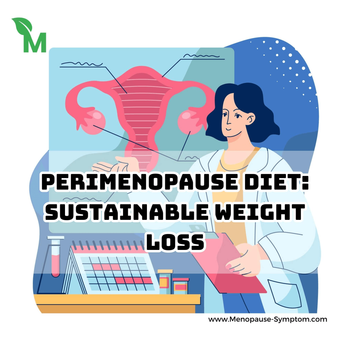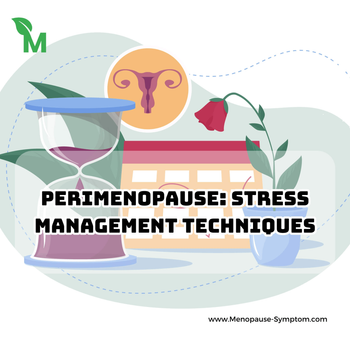Menopause And Weight Management: Effective Strategies
On
07/10/2024Reading time:
5 min
Summary:
Menopause is a natural phase in every woman's life, usually starting around the ages of 45 to 55. Hormonal changes and accompanying symptoms make many women feel insecure, especially about their health and weight.
During perimenopause, women often experience changes in their bodies that make weight management more difficult. However, effective strategies can help overcome these difficulties, maintain a healthy weight and quality of life.
Know about perimenopause and menopause
Perimenopause is the time when the body begins the natural transition to menopause, marking the end of a woman's reproductive years. Perimenopause is also known as the menopausal transition, at which time the body will no longer ovulate, menstruation will disappear and fertility will no longer be possible. This period usually occurs at the age of 45-50, and can last 2-5 years depending on the person.
Menopause is the second transitional stage in a woman's reproductive life, caused by a decline in ovarian function. The ovaries stop working and stop secreting female hormones, leading to the cessation of monthly menstruation and the end of a woman's fertility.
During this period, a woman's body will experience a number of symptoms that affect her health and life:
1. Irregular menstrual cycle or amenorrhea
· This is the first symptom of perimenopause, when women suddenly find that their menstrual cycle becomes irregular and unpredictable compared to before. The amount of menstrual blood may suddenly be less or more (hypermenorrhea or hypomenorrhea), or menstruation may be absent in some cycles.
2. Hot flashes
· Hot flashes are a fairly common sign of early menopause, women will start to have hot flashes that suddenly start in the face, neck and then spread to other parts. In addition, women also sweat, have a fast heartbeat... making the body tired and feel cold.
3. Vaginal dryness
· Because the amount of female hormones decreases, women's vaginas will have changes such as becoming drier, less elastic... Dryness is the reason why women feel pain and have difficulty having sex. In addition, the decrease in female hormones also reduces sexual desire in women, making it more difficult to achieve orgasm during sex.
4. Affects sleep
· Women with early menopause may experience sleep problems such as insomnia, poor sleep. Some people may wake up frequently in the middle of the night and have difficulty falling back asleep.
5. Mood swings, irritability
· Early menopause makes women easily complicate all problems, making it difficult to control their emotions, easily getting angry, irritable for no reason... There are cases where the psychology becomes more unstable when entering the premenopausal period and there is a risk of developing into depression.
Therefore, many women find that losing weight becomes more difficult during menopause. However, instead of accepting it as fate, women can completely apply simple tips and strategies to maintain their figure.
Health and weight control strategies
One of the strategies for weight management during menopause is to adjust the diet. Women should focus on consuming more nutritious foods, such as fruits, vegetables, whole grains and vegetable proteins. These foods not only provide the necessary energy but also help maintain a feeling of fullness for longer, thereby preventing indiscriminate eating.
Eating smaller meals throughout the day is also an effective strategy for weight management. By eating several small meals throughout the day, your body will have a better chance of digesting and absorbing nutrients, while also minimizing excessive cravings. This is especially important during perimenopause, when the body tends to store more fat.
In addition to a reasonable diet, regular exercise is also an indispensable part of weight management during menopause. Research shows that aerobic exercises such as walking, swimming or cycling not only help burn calories but also improve mood and sleep. At the same time, strength training is also very useful, helping to build muscle and increase metabolism.
It is also important to pay attention to psychology during this period. Menopause is not only related to physical changes but also great psychological pressures. Women should find ways to practice relaxation exercises such as yoga, meditation or simply take time for themselves. These activities help improve mood and reduce anxiety levels, which also contributes to better weight management.
In addition, you should monitor your health regularly during this period. Regular check-ups not only help detect health problems early but also help women update their body indexes, thereby making appropriate adjustments in their lifestyle. This may not directly affect weight management, but will help women feel more confident in their bodies.
One thing to note is that you should not be too hard on yourself during menopause. It is the comfort and ease in thinking that will help reduce unnecessary pressure, helping women feel happier with their bodies. Small changes in thinking can have a big impact, thereby helping the weight management process become more effective.
When menopause begins, many women often experience symptoms such as hot flashes, mood swings and insomnia. These symptoms can affect eating habits and lifestyle, thereby hindering weight management. Therefore, seeking support from those around you or joining a support group can be a great solution.
Finally, to improve health and weight during menopause, using natural support products can also be effective. Many women have found help from herbs, vitamin and mineral supplements necessary for the body. Before starting any product, you should consult your doctor or nutritionist to ensure safety and effectiveness.
Weight management during menopause is not too difficult. By applying effective strategies, women can easily maintain their health and figure. Remember, the most important thing is to love and care for yourself. Menopause is not the end, but a new journey, a new chapter in life. Live positively and love life in every moment of this life.
Source: Team MPS compiled, analyzed and wrote. Please dont reup without source. Many thanks.

Perimenopause Diet: Sustainable Weight Loss
09.02.2024
Perimenopause, an important transitional stage in a woman's life, is often associated with many physical and psychological changes.

Menopause: Time Management Tips For Busy Menopausal Women
09.02.2024
Menopause is a natural phase in every woman's life, usually starting between the ages of 45 and 55, when the body changes and begins to stop producing estrogen.

Perimenopause: Stress Management Techniques
Invalid Date
In every woman's life journey, perimenopause is a special period, marking a major physical and psychological transformation. Perimenopause is not simply a change in hormones, but also a time when imbalance can lead to negative emotions.
